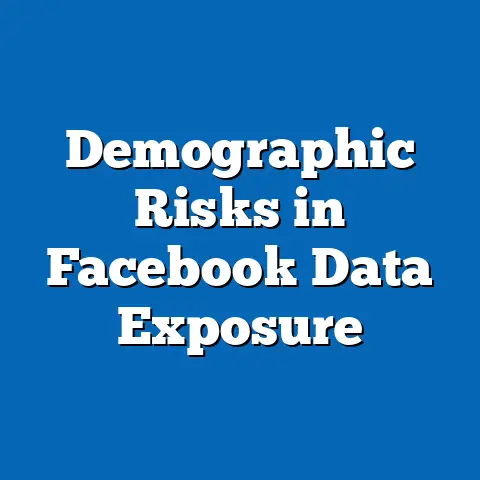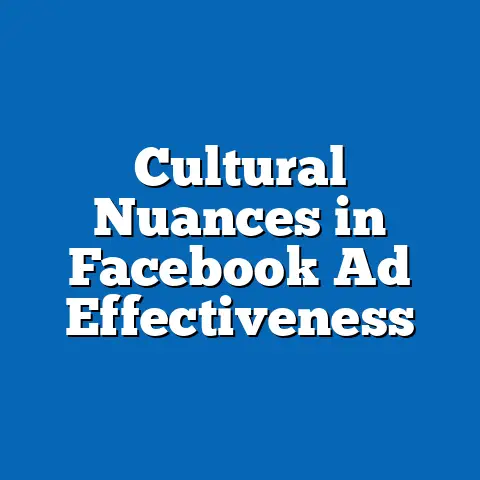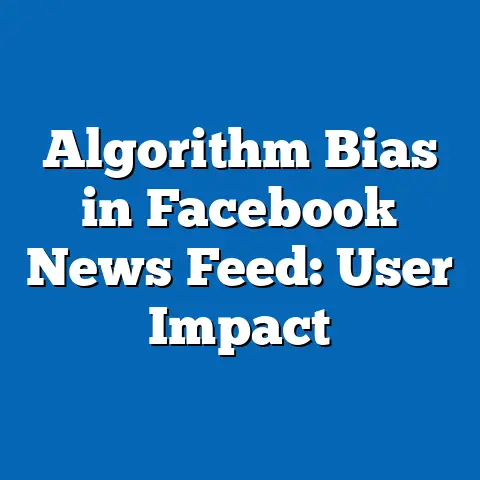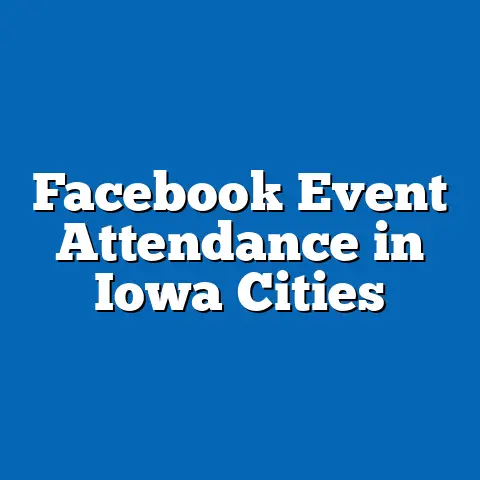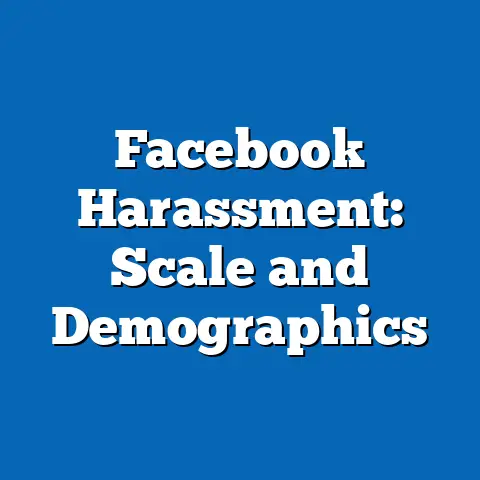Facebook Policy Changes: User Behavior Shifts
This article explores the intricate relationship between Facebook’s policy changes and the resulting adaptations in user engagement.
While the platform’s policies are often designed to address privacy concerns, combat misinformation, or enhance user experience, they have profound implications for how different generations interact with the platform.
Before delving into the specifics of policy changes and user behavior, it is essential to contextualize the discussion within the framework of generational dynamics.
Each generation—spanning from Baby Boomers to Generation Z—has distinct needs and expectations when interacting with social media platforms like Facebook.
These “room-specific needs,” as we will refer to them metaphorically, represent the unique digital spaces and requirements that different age cohorts demand from technology, shaped by their historical, cultural, and social contexts.
Room-Specific Needs: Generational Contexts and Expectations
Defining “Room-Specific Needs” in the Digital Age
The concept of “room-specific needs” draws an analogy between physical spaces and digital environments, suggesting that just as individuals require tailored physical rooms for different purposes (e.g., a quiet study, a lively social hub), generations have unique needs in their digital interactions.
These needs are influenced by the technological, economic, and cultural contexts in which each generation came of age.
On platforms like Facebook, these needs manifest in preferences for privacy settings, content types, communication styles, and platform functionalities.
Understanding these differences is crucial to analyzing how policy changes affect user behavior across age groups.
Baby Boomers (Born 1946–1964): Characteristics and Historical Context
Baby Boomers, born in the post-World War II era, grew up during a time of economic prosperity and significant social change in the United States and other Western nations.
Key historical events like the Civil Rights Movement, the Vietnam War, and the rise of television shaped their worldview, fostering a mix of optimism and skepticism toward institutions.
In the digital realm, Boomers often prioritize connection with family and friends over public self-expression.
According to a 2021 Pew Research Center report, 70% of Boomers use Facebook primarily to stay in touch with loved ones, compared to younger generations who often use it for broader networking or entertainment.
Their room-specific need is a “family living room”—a safe, familiar space for personal updates and nostalgia, with a strong emphasis on privacy and ease of use.
Societally, Boomers’ adoption of social media has implications for political discourse, as they are more likely to engage with news content on platforms like Facebook.
However, their limited tech savviness compared to younger generations can make them vulnerable to misinformation, a concern amplified by policy changes around content moderation.
Generation X (Born 1965–1980): Characteristics and Historical Context
Generation X, often described as the “latchkey generation,” grew up during a period of economic uncertainty, the rise of personal computing, and the advent of MTV.
Sandwiched between the idealism of Boomers and the digital nativism of Millennials, Gen Xers are known for their independence, adaptability, and skepticism of authority.
On Facebook, Gen X seeks a “personal office”—a space for both professional networking and personal connection, balancing work and life.
A 2020 study by eMarketer found that Gen X users are more likely to join interest-based groups and engage with marketplace features compared to other generations.
Their historical context of witnessing the early internet boom means they are tech-literate but cautious, often valuing functionality over flashy features.
The societal implication of Gen X’s engagement with Facebook lies in their role as a bridge between older and younger users.
Their behavior often influences family dynamics on the platform, as they connect Boomers to younger relatives while navigating policy changes with a pragmatic lens.
Millennials (Born 1981–1996): Characteristics and Historical Context
Millennials came of age during the dot-com bubble, the 9/11 attacks, and the 2008 financial crisis, events that shaped their economic insecurity and reliance on technology for solutions.
As the first generation to grow up with the internet, they are digital natives who view social media as an extension of their identity.
For Millennials, Facebook serves as a “public square”—a space for self-expression, activism, and community building.
Data from a 2022 Nielsen report indicates that 65% of Millennials use Facebook for event planning and social causes, far higher than other cohorts.
However, their trust in the platform has waned due to privacy scandals, pushing them to demand transparency in policies.
Societally, Millennials’ behavior on Facebook influences cultural trends, from meme culture to influencer marketing.
Their room-specific need for authenticity and engagement often clashes with policy changes that prioritize algorithmic content over personal connections, leading to notable shifts in usage patterns.
Generation Z (Born 1997–2012): Characteristics and Historical Context
Generation Z, the true digital natives, grew up with smartphones, social media, and constant connectivity.
Shaped by events like the Great Recession, climate change debates, and the COVID-19 pandemic, they are pragmatic, socially conscious, and highly critical of corporate overreach.
On Facebook, Gen Z’s room-specific need is a “creative studio”—a space for experimentation, viral content, and niche communities, though they increasingly prefer platforms like Instagram and TikTok.
According to a 2023 Morning Consult survey, only 32% of Gen Z users consider Facebook their primary social media platform, down from 50% in 2015.
They value privacy but are also accustomed to data sharing, creating a complex relationship with policy changes.
Societally, Gen Z’s limited engagement with Facebook signals a generational shift in social media preferences, pushing platforms to adapt or risk obsolescence.
Their behavior also highlights the importance of inclusivity and mental health considerations in digital spaces, areas often addressed by policy updates.
Societal Implications of Room-Specific Needs
The diversity in room-specific needs across generations underscores the challenge Facebook faces in crafting policies that cater to all users.
Policies on privacy, content moderation, and advertising must balance the family-oriented needs of Boomers with the creative demands of Gen Z, often leading to friction.
Moreover, these generational differences have broader implications for digital literacy, political polarization, and cultural norms.
As policies shift, they can either bridge or widen these generational divides, influencing how society navigates issues like misinformation, online safety, and community building in the digital age.
Facebook Policy Changes: A Historical Overview
Early Years (2004–2010): Openness and Privacy Concerns
Facebook’s initial policies were rooted in openness, encouraging users to share personal information with minimal restrictions.
The introduction of the News Feed in 2006 was a pivotal change, transforming the platform from a static profile hub to a dynamic content stream.
However, it sparked backlash from users across generations who felt their privacy was violated by automatic updates.
In response, Facebook introduced rudimentary privacy settings, allowing users to control who saw their posts.
This early policy shift highlighted a tension between user control and platform growth, a theme that persists today.
For Boomers and Gen X, who were just entering the platform, these changes were often confusing, while Millennials embraced the News Feed as a tool for connection.
The Privacy Reckoning (2011–2018): Scandals and Regulation
The 2010s marked a turning point for Facebook’s policies, driven by growing scrutiny over data privacy.
The 2011 Federal Trade Commission (FTC) settlement, which accused Facebook of deceptive privacy practices, led to stricter consent requirements for data sharing.
However, the 2018 Cambridge Analytica scandal—where user data was misused for political advertising—eroded trust further, especially among Millennials and Gen Z.
Policy changes post-2018 included enhanced data transparency tools and restrictions on third-party app access.
These shifts aimed to rebuild trust but also altered user behavior, with a 2019 Pew Research study noting a 15% drop in daily active users among Millennials due to privacy concerns.
Boomers, conversely, remained relatively stable in usage, prioritizing connection over privacy fears.
Content Moderation and Misinformation (2019–Present): Balancing Free Speech and Safety
In recent years, Facebook (now Meta) has faced immense pressure to address misinformation, hate speech, and harmful content.
Policy updates, such as the 2020 ban on QAnon-related content and stricter fact-checking measures during elections, reflect a shift toward proactive moderation.
The 2021 Oversight Board, an independent body reviewing content decisions, further signaled a commitment to accountability.
These changes have had varied impacts across generations.
Gen Z and Millennials often support stricter moderation for safety, while some Boomers and Gen X users perceive these policies as censorship, according to a 2022 YouGov poll.
This generational divide illustrates how policy changes can exacerbate cultural and political tensions.
User Behavior Shifts Across Generations
Privacy Policies and Behavioral Adaptations
Facebook’s evolving privacy policies have significantly influenced how users engage with the platform.
For Boomers, enhanced privacy controls have encouraged greater participation, as they feel safer sharing family updates.
A 2021 AARP survey found that 60% of Boomers adjusted their privacy settings post-2018, compared to only 40% pre-scandal.
Millennials and Gen Z, however, have shown a more pronounced shift, with many reducing personal posts and turning to private groups or alternative platforms.
Data from eMarketer (2022) indicates a 20% increase in Millennial use of Instagram over Facebook for personal sharing, reflecting a preference for platforms perceived as more privacy-friendly.
Content Moderation and Engagement Patterns
Content moderation policies have also reshaped user behavior, particularly around political and social discourse.
Gen X and Boomers, who often engage with news content, have reported frustration with algorithmic deprioritization of controversial topics, with a 2023 Statista survey showing 45% of Gen X users feel “silenced” by moderation rules.
Conversely, Gen Z appreciates efforts to curb misinformation but has largely migrated to platforms with less restrictive content policies for raw, unfiltered expression.
This generational split underscores the challenge of creating a one-size-fits-all moderation framework.
Algorithmic Changes and Content Consumption
Facebook’s algorithmic updates, designed to prioritize “meaningful interactions” over viral content, have altered how users consume and share information.
Millennials, who once used Facebook as a public square, now report lower engagement due to reduced visibility of friends’ posts, per a 2022 Nielsen study.
Many have shifted to Stories or groups for interaction.
Boomers, however, benefit from algorithms favoring family content, maintaining steady usage.
Gen Z, already disengaged, shows little behavioral change from algorithmic tweaks, as their focus remains on visual platforms like TikTok.
Societal and Cultural Implications
Digital Divide and Generational Tensions
Facebook’s policy changes have both mitigated and exacerbated the digital divide across generations.
While privacy tools empower older users, complex settings can alienate Boomers with lower tech literacy.
Conversely, younger users’ migration to other platforms signals a cultural shift, potentially isolating older generations from broader digital conversations.
These tensions also play out in political discourse, as content moderation policies disproportionately affect topics of interest to different age groups.
The result is a fragmented digital public sphere, where generational echo chambers are reinforced rather than challenged.
Workplace and Economic Impacts
In the workplace, Facebook’s role as a networking tool has been influenced by policy shifts.
Gen X and Millennials, who once used the platform for professional branding, now hesitate due to privacy concerns, turning to LinkedIn instead.
A 2023 LinkedIn report noted a 30% increase in Millennial activity on the platform since 2019, correlating with Facebook’s privacy scandals.
Economically, policy-driven user shifts impact small businesses and advertisers reliant on Facebook’s reach.
As younger users disengage, businesses must pivot to platforms like Instagram or TikTok, often at higher costs, reshaping digital marketing strategies.
Mental Health and Community Building
Policy changes around content moderation have implications for mental health, particularly for younger users.
Gen Z, already vocal about online toxicity, benefits from stricter hate speech rules but remains critical of algorithmic content that prioritizes engagement over well-being.
A 2022 study by the American Psychological Association linked heavy social media use to anxiety among Gen Z, a trend exacerbated by platforms like Facebook.
Conversely, Boomers and Gen X often find community through Facebook groups, a feature less affected by policy shifts.
This highlights the platform’s dual role as both a source of stress and support, depending on generational needs.
Forward-Looking Insights and Uncertainties
As Facebook continues to evolve under Meta’s umbrella, future policy changes will likely focus on integrating augmented reality, enhancing AI-driven moderation, and addressing regulatory pressures.
However, uncertainties remain about how these shifts will resonate across generations.
Will Boomers adapt to immersive technologies, or will they retreat further into familiar digital spaces?
Can Facebook regain Gen Z’s trust, or has the generational exodus to TikTok and Snapchat solidified?
These questions underscore the platform’s challenge in balancing innovation with accessibility.
Moreover, global regulatory frameworks, such as the EU’s Digital Services Act, will force policy adaptations that could further alter user behavior.
While data suggests younger generations are more adaptable to change, the long-term societal impact of a fragmented social media landscape remains unclear.
Conclusion
Facebook’s policy changes over the past two decades reflect a complex interplay of technological innovation, user demands, and societal pressures.
From privacy scandals to content moderation debates, each policy shift has reverberated across generations, reshaping how Baby Boomers, Gen X, Millennials, and Gen Z engage with the platform.
Understanding these shifts through the lens of room-specific needs reveals the diversity of user expectations and the challenges of crafting universal policies.
While Boomers seek a safe family space, Millennials demand authenticity, and Gen Z prioritizes creativity, Facebook must navigate these competing priorities to remain relevant.
The societal implications—spanning political discourse, workplace dynamics, and mental health—highlight the platform’s outsized role in shaping digital culture.
As we look to the future, the interplay between policy and behavior will continue to evolve, offering both opportunities and challenges for a platform at the heart of generational connectivity.

